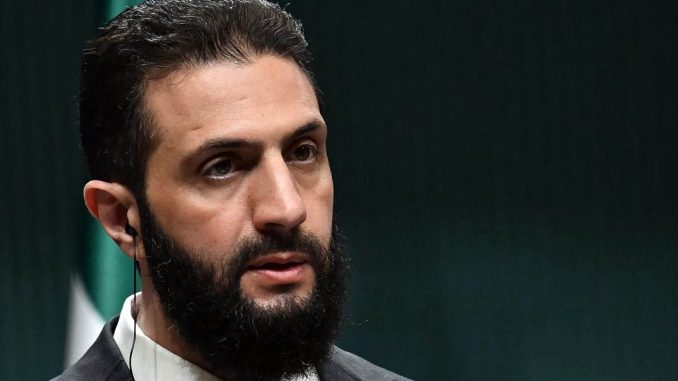
Syria’s Ministry of Information on Sunday denied reports that an attempt was made on the life of interim president Ahmed Al-Sharaa during a recent visit to the southern city of Daraa. (AFP/File Photo)
| Published June 30, 2025
Damascus denied on Sunday media reports alleging an assassination attempt on President Ahmad al-Sharaa during a visit to the southern Daraa province.
In a climate of heightened uncertainty and fragile political transition, Syria’s interim government has firmly denied reports of an attempted assassination on President Ahmed al‑Sharaa during a visit to the restive southern province of Daraa. The alleged plot—initially attributed to Islamic State-linked militants and reportedly foiled by Syrian and Turkish forces—has sparked a wave of speculation and conflicting narratives. As media outlets and officials trade claims and counterclaims, the controversy underscores the tense security environment surrounding Syria’s new leadership in the post-Assad era.
🔍 Context and Claims
-
Al‑Sharaa’s visit to Daraa (June 6): Reports emerged—first via Lebanese LBCI TV—that an IS‑linked cell planned to assassinate President Ahmed al‑Sharaa during his official trip. Allegedly, Syrian army and Turkish intelligence arrested the plotters on June 5, just before his arrival.
-
Denials from Damascus: Syria’s Ministry of Information and state-run SANA categorically rejected these claims as baseless. A government source stated, “There is no truth in circulated media reports” that the Syrian Army and Turkish intelligence foiled an assassination attempt. No further evidence or details were provided.
🔁 Why it matters?
-
Security landscape in post‑Assad Syria:
Since Bashar al‑Assad’s departure in December, President al‑Sharaa—once a commander within HTS—has led a fragile transitional government. His ascent has intensified scrutiny of internal security, insurgent threats, and Western engagement. -
Prevailing threats:
U.S. envoy Tom Barrack already raised alarms earlier this month about extreme threats to al‑Sharaa, citing risks from both IS remnants and state-backed factions like Iran. He emphasized the urgent need for enhanced protective measures. -
Domestic factionalism:
Opposing forces—including jihadist elements, Iranian-backed militias, and former Assad loyalists—remain active. Their motivations range from destabilizing the transitional government to reasserting influence or ideological control. .
🧭 Analysis
-
Lack of transparent evidence: Neither the government nor media have released names, operation details, or arrest documentation supporting the assassination plot claim.
-
Possible political strategy: Such allegations might serve as a lever—either by Gulf-aligned outlets to justify Turkish involvement, or by Damascus to portray threats and bolster defense cooperation.
-
High-risk environment for al‑Sharaa: Whether real or inflated, threats remain credible. His Western outreach and reform agenda already antagonize powerful extremist and militia actors.
 Resulting Effects
Resulting Effects
The conflicting reports about the alleged assassination attempt have had ripple effects both domestically and internationally:
-
Heightened Political Tensions: The rumor—despite its denial—has reignited fears of instability and exposed the deep fractures within Syria’s transitional landscape. Rival factions may exploit the confusion to challenge al‑Sharaa’s leadership or escalate unrest.
-
Increased Security Measures: Security protocols around President al‑Sharaa and other top officials have reportedly been reinforced. Although unconfirmed, the mere circulation of such threats has pressured Damascus to demonstrate control and vigilance.
-
Diplomatic Ripples: Regional actors like Turkey and Iran, often viewed as adversaries in Syria’s internal politics, now face renewed scrutiny. The alleged involvement of Turkish intelligence in thwarting the plot—denied by Damascus—complicates their already strained relations.
-
Public Distrust: Conflicting narratives from media, opposition voices, and the state risk deepening public skepticism. With no concrete evidence released, citizens remain caught between state censorship and unreliable rumors.
-
Global Watchfulness: Western diplomats and intelligence communities are monitoring the situation closely. Any credible threat to al‑Sharaa could reshape international engagement in Syria’s fragile recovery process.
 Bottom Line:
Bottom Line:
Whether an actual threat or a manufactured narrative, the alleged assassination attempt on President Ahmed al‑Sharaa has exposed the volatile dynamics of Syria’s transitional period. The government’s swift denial has done little to dispel speculation, and the absence of transparent evidence leaves room for competing interpretations. What remains clear is the persistent vulnerability of Syria’s leadership and the high-stakes environment it operates in—where perception, propaganda, and power struggles intersect. As the country inches forward from decades of conflict, even unconfirmed reports like this can unsettle progress and amplify the fragility of peace.





Be the first to comment